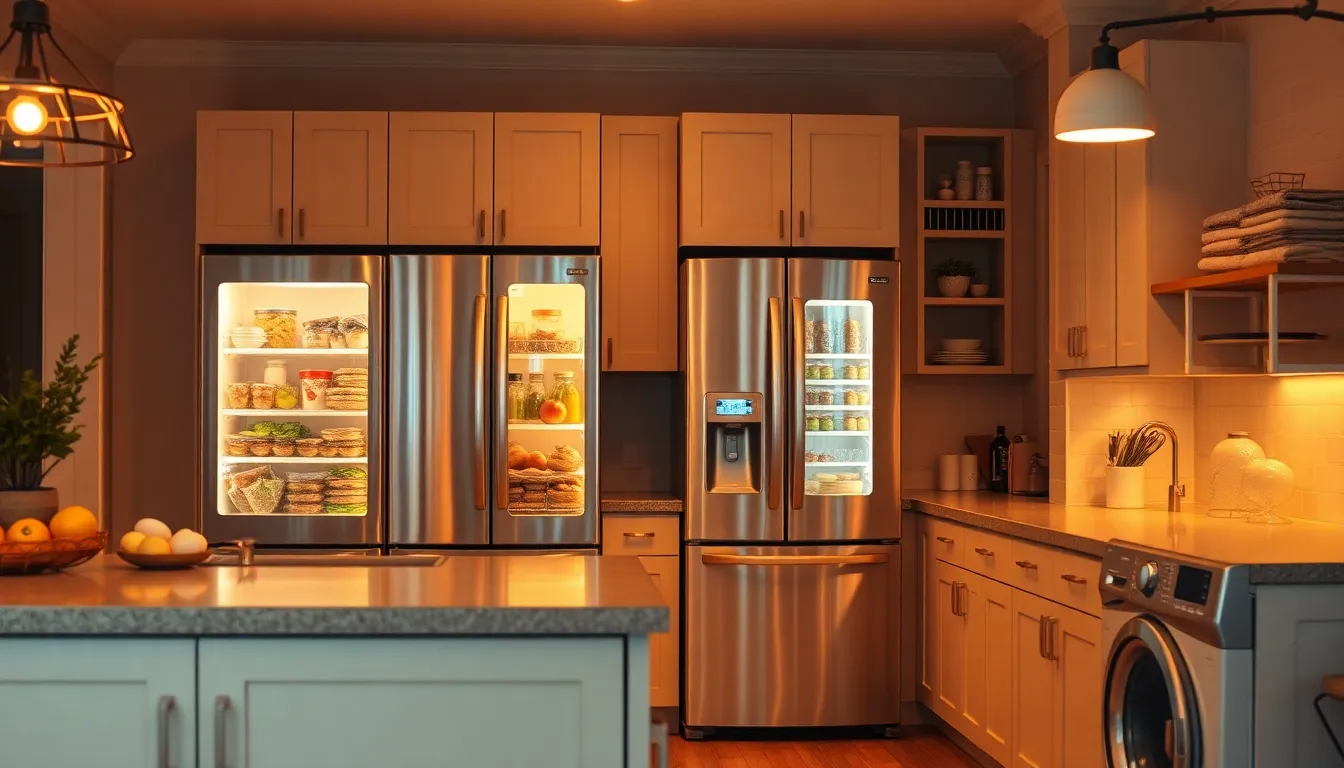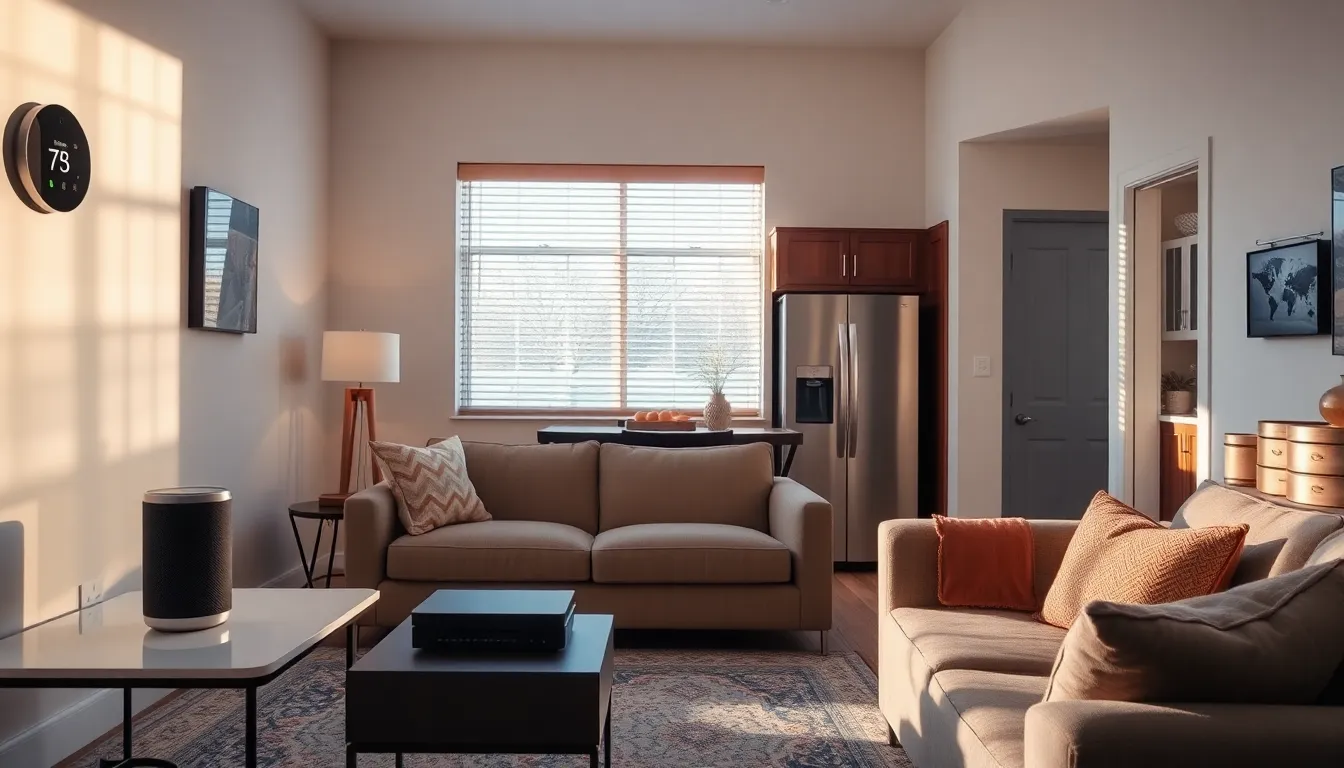Imagine walking into your home and having it greet you like an old friend. AI home systems are transforming the way people interact with their living spaces, making homes smarter, more efficient, and a lot more fun. These systems aren’t just about convenience; they’re about creating a lifestyle where technology works for you, not the other way around.
Table of Contents
ToggleOverview of AI Home Systems
AI home systems integrate advanced technology to optimize daily living. These systems enhance home automation through voice-activated assistants, smart appliances, and security features. Homeowners can control lighting, temperature, and entertainment systems remotely, providing convenience and energy efficiency.
Smart speakers, such as Amazon Echo and Google Nest, facilitate voice commands and manage other smart devices. Integration of these systems allows centralized control over multiple devices, streamlining operations. Additionally, smart thermostats learn user preferences, adjusting settings to ensure comfort while reducing energy consumption.
Security systems increasingly incorporate AI features, such as facial recognition and real-time surveillance alerts. This technology enhances safety, ensuring peace of mind for homeowners. Smart locks provide keyless entry, allowing users to manage access remotely.
Data from Statista indicates that the global smart home market is projected to reach $174 billion by 2025, emphasizing the growing interest in AI technologies within homes. Adoption rates continue to rise as consumers seek greater convenience and security in daily life.
AI home systems offer enhanced functionalities and seamless integration with everyday tasks, reflecting a shift towards greater reliance on intelligent technology. With continuous advancements, these systems evolve rapidly, catering to diverse user needs. Overall, AI home systems contribute significantly to smarter, more connected living environments.
Key Features of AI Home Systems

AI home systems incorporate various features that enhance user experience. They include smart appliances, home automation, and security measures that create a connected living environment.
Smart Appliances
Smart appliances play a central role in AI home systems. Refrigerators monitor food inventory and suggest recipes based on available ingredients. Washing machines can be controlled remotely, allowing users to operate them from anywhere. Ovens use built-in sensors to adjust cooking times automatically. This technology improves efficiency and convenience, ultimately transforming daily household tasks into seamless operations.
Home Automation
Home automation simplifies the management of household devices. Users can schedule heating or cooling adjustments based on their routines, ensuring comfort when they arrive home. Lighting systems respond to voice commands, allowing for hands-free control over ambiance. Additionally, smart blinds can open or close based on time of day, enhancing energy savings and privacy. Overall, these automated features adapt to personal habits, making life easier and more efficient.
Security and Surveillance
Security and surveillance technologies enhance home safety significantly. AI systems employ facial recognition to identify residents and alert homeowners to unfamiliar faces. Smart cameras provide real-time video feeds, accessible from mobile devices, which increases situational awareness. Motion detectors trigger alerts, notifying users of unusual activity near their homes. These advanced security features provide peace of mind and a sense of control over personal safety.
Benefits of AI Home Systems
AI home systems offer numerous advantages that significantly improve daily living. Individuals experience increased energy efficiency, enhanced security, and heightened convenience and comfort.
Energy Efficiency
Energy efficiency becomes a reality through smart home technology. Smart thermostats, for instance, adapt to user behaviors and automatically adjust heating and cooling. Users see reductions in energy bills because devices optimize usage during off-peak hours. Smart lighting systems also contribute by adjusting based on occupancy or natural light levels. Homes equipped with these technologies minimize waste, ultimately supporting environmental sustainability.
Enhanced Security
Enhanced security stands as a critical benefit of AI home systems. Real-time surveillance cameras and motion sensors provide constant monitoring of property. Homeowners receive immediate alerts when unusual activity occurs, ensuring swift response to potential threats. Smart locks enhance safety by allowing remote access control and temporary guest codes. Facial recognition technology identifies residents and alerts homeowners about unrecognized individuals, increasing peace of mind.
Convenience and Comfort
Convenience and comfort define the daily experience with AI home systems. Voice-activated assistants manage different smart devices around the home with simple commands. Smart appliances, such as refrigerators and ovens, streamline meal preparation by managing tasks autonomously. Customizable settings allow users to create personalized environments, whether it’s adjusting the temperature or playing music. Integration of various devices simplifies management, allowing seamless control from a single platform.
Challenges and Considerations
AI home systems present several challenges and considerations for homeowners. Awareness of privacy concerns and costs associated with implementation is essential when integrating these technologies.
Privacy Concerns
Concerns about privacy arise with the adoption of AI home systems. Smart devices often collect data on personal habits and preferences, leading to potential misuse of this information. Users might feel uneasy sharing sensitive data with companies that operate these systems. Security measures for data encryption and protection must remain integral, as breaches can expose private information. Transparency from manufacturers about data handling practices significantly fosters trust among consumers. Consequently, understanding how these systems manage privacy is crucial for informed decisions.
Cost of Implementation
The cost of implementing AI home systems varies widely based on features and devices. Initial investments may include purchasing smart appliances, security systems, and necessary infrastructure upgrades. Estimates indicate that the total cost can range from a few hundred to several thousand dollars. Long-term savings on energy bills and increased home value often justify these expenses. Budget planning benefits homeowners by allowing phased implementations. Prioritizing essential features over luxury enhancements helps streamline costs and provides flexibility during the transition.
AI home systems are revolutionizing the way people experience their living spaces. By integrating advanced technology these systems enhance comfort convenience and security. As homeowners embrace smart appliances voice-activated assistants and automated controls they enjoy a lifestyle tailored to their needs.
The growing popularity of these systems reflects a shift towards more efficient and enjoyable homes. While challenges such as privacy concerns and initial costs exist careful planning can lead to significant long-term benefits. Embracing AI technology not only simplifies daily tasks but also contributes to a more sustainable and secure living environment. As the market continues to expand homeowners will find even more innovative solutions to enhance their quality of life.




